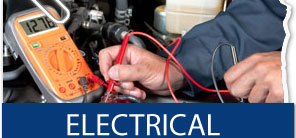
Does your car, truck, or van have an electrical problem? The last thing you want is someone who wiggles wires and replaces things, hoping to stumble upon the solution. Skilled troubleshooting is vital, but many auto repair shops are not willing to tackle electrical repairs. And for good reason. Late-model vehicles are packed with a network of several computers connected to just about everything. And that’s on top of the alternator, ignition system, lights, starter motor, and a host of accessories. Besides the complexity of a vehicle’s electrical system, electrical and electronics problems can be invisible. There’s often nothing like a broken bolt or leak to be seen nor sound to be heard.
That’s why it’s always important to choose an auto repair shop with an electrical and electronics diagnostics expert. If they aren’t an ASE Certified Master Mechanic themselves, there should be at least one among the other mechanics. The specialist should be backed by up-to-date test equipment and have access to the latest manufacturers data. And of course they should also be well-trained and have extensive hands-on experience.
Starting Up
If your vehicle won’t start, there could be a variety of reasons from a clogged fuel filter to something major. It’s important to observe exactly what happens when you turn the key. If absolutely nothing happens, or there’s just a single click, most likely the battery is drained. That could be because it’s old or because the alternator or charge control isn’t working properly. But that could also be because of a failed starter motor or starter solenoid. If the engine turns over normally but never starts, most likely that’s a fuel or ignition system problem.
Car Battery Electrical Problems
Depending on brand and model, car batteries typically last 3 to 7 years when properly maintained. If the starter motor turns the engine over slowly or the headlights dim while stopped or driving slowly it’s very likely time for a new battery. A good auto shop can perform a visual inspection and load-test to make sure. If you’re about to head out for a ski trip, a quick battery check up is a good idea. An engine needs more power to crank in the cold, while at the same time batteries have lower output at lower temperatures.
Ignition System
Some vehicles still use the old-style ignition system of coil, distributor, and spark plugs. Although the plugs remain, most vehicles nowadays use electronic ignition for greater power and fuel economy, with timing controlled by one of the power-train computer modules. If your engine is idling roughly, is misfiring, or has lost some power it may well be overdue for new spark plugs or there might be an electronics problem. Due to the extremely high voltages involved, old spark-plug wires can cause similar problems.
Alternator
The alternator generates electricity to meet all needs while the engine is running, including recharging the battery. A faulty alternator can produce the symptoms of an old or bad battery, as can problems in the charge controller (now usually part of the on-board computers).
ABS
Anti-lock braking systems feed several sensors into a computer module that in turn automatically pumps the brakes to avoid skidding. This only happens when necessary, so you may well not notice anything despite having something wrong. As a critical safety feature, it’s important to have this system regularly inspected and tested by an expert.
Control Computers
Most cars now have numerous — often a dozen or more — computer chips connected up to seemingly countless sensors spread throughout the engine, transmission, emission controls, cooling system, accessories, and the entire vehicle. They then control just about everything, improving performance while reducing emissions. They also control those dashboard warning lights, and send out codes to a mechanic identifying the exact nature of many problems. Those are big benefits, but this network itself can have faults, and it take sophisticated test instruments and more than a little experience to determine exactly what’s gone wrong.
Electric Accessories
Your car’s electrical system includes countless other features and functions. Electrical repairs may also involve any of the numerous accessories found even in economy cars (such as air conditioning and heater fans, brake lights, dashboard lights and gauges, defrosters, electronic door locks, headlights, power windows, radio and CD player, turn signals…), as well as the amenities only found in luxury vehicles (such as self-adjusting suspensions and seat warmers).
